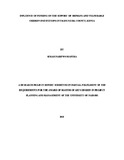| dc.description.abstract | The Global burden of Orphans and Vulnerable Children has reached crisis proportions, with
10-13 Million People estimated to be Orphans. This has shaken the already weak Economic and
Social infrastructures of many developing Nations. In sub-Saharan Africa, the number of
orphaned children has risen and has weakened the capacity of many Countries to care for their
Orphaned Children. Recognizing the need to support the growing Orphan Population, OVC
Institutions have started in many countries. Many Non-Governmental Organizations (NGOS)
and Faith-Based Agencies (FBA) have founded Orphanages to provide care for Children. This
study explored the influence of funding on the support of Orphans and Vulnerable Children
institutions in Trans Nzoia County, Kenya. In terms of research minimum focus has been on the
influence of funding in supporting OVC Institutions thus the need of this research. The main
objectives of this study were to ascertain the influence of Donations and Grants on the support of
Orphans and Vulnerable Children Institutions in Trans Nzoia County, To establish the influence
of Foreign Aid on the support of Orphans and Vulnerable Children Institutions in Trans Nzoia
County, To establish the influence of Local Financing on the support of Orphans and Vulnerable
Children Institutions in Trans Nzoia County and To establish the influence of Self Financing on
the support of Orphans and Vulnerable Children Institutions in Trans Nzoia County. This study
adopted a Descriptive survey Research Design. Descriptive survey is a research design in which
Questionnaires are administered to a Sample of respondents in order to collect data about the
characteristics, actions, opinions or attitudes of a large group of People. A total of 59 OVC
Institution directors and 5 children officers were used as the sample size. The raw data that was
obtained from this study was cleaned, organized, categorized, evaluated and key-punched using
Computer Programme Statistical Package for Social Science (SPSS) version 17.0.Then the data
was qualitatively analyzed by subjecting it to Thematic analysis which yielded both Descriptive
and inferential statistics. 44% of the respondents disagreed to receiving money from
foundations, with 10 % strongly disagreeing. However, another 53% agreed to receiving funds
from grants, with 34% strongly agreeing. 55% of the respondents agreed to receiving foreign
aids from well-wishers abroad.44% on the other hand disagreed. In general however, 87% of the
respondents disagreed to the money being sufficient for their needs. From the research it was
clear that most institutions largely depend on donations & grants, foreign aid. Very little is
collected from local businesses and individuals. Self-financing is also overlooked by many of the
institutions. The researcher also found out that the government does not offer any financial
assistance to these institutions. The researcher recommends that the institution directors should
source for more funds as the available funds are not enough. Self-financing is also encouraged
for sustainability. The government and the locals should also step up and give financial
assistance to these institutions. | en_US |

